|  
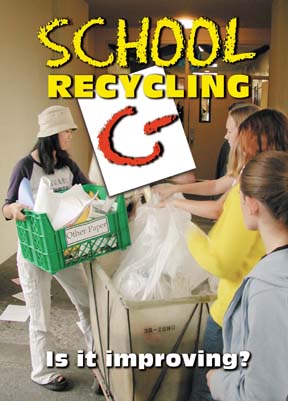
by GEORGE RINGWALD
FOR MANY IN TODAY'S "throw-away generation" -- as it's so aptly called by syndicated columnist Andy Rooney -- recycling gets no more than a passing nod. But it stirs deep passions among its believers, certainly in Humboldt County as one finds in a month's worth of interviews. 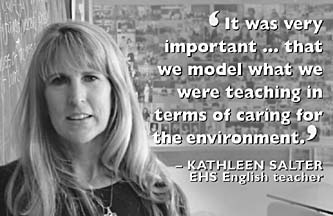 Kathleen Salter, an English teacher going on her 11th year at Eureka High School, was upset, I'd heard, when she learned that John Rodgers, the custodian for her room, had orders from his boss to "take all the paper and just throw it in the dumpster." Kathleen Salter, an English teacher going on her 11th year at Eureka High School, was upset, I'd heard, when she learned that John Rodgers, the custodian for her room, had orders from his boss to "take all the paper and just throw it in the dumpster."
"Upset" didn't begin to express it, she said. "I was incensed!" Bob Chapman, a fellow English teacher at Eureka High (they both teach a course called Nature Writing), shared her anger, and both assured an apologetic Rodgers that they would take papers on their own to their recycling bins. "It was very important to us individually," Salter said, "but also as teachers that we model what we were teaching in terms of caring for the environment, using resources responsibly, and showing that recycling is part of stewardship, as stewards of the earth." You don't hear many folks these days talking about their earth stewardship responsibilities. Indeed, as Chapman says, "You know, there are people in our community who don't view recycling as a good thing. Some people, you know, are just philosophically opposed to recycling. A number of years ago I had a custodian who always threw away my recycling, and I had to go to great lengths to get him to quit doing it." Chapman, 43, who is now in his 15th year at Eureka High, says: "I remember when I was a kid we saved all our bottles and took them back to the store. My grandmother kept all the newspapers, and she used to make newspaper `logs' for the fire. People used to save string. And we still have our `twisties' and rubber bands, because that's what my parents did. They saved all that stuff." 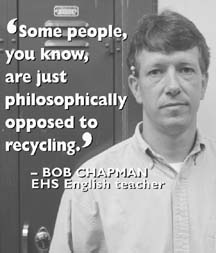 But in today's quick-and-easy disposal age, Chapman admits to being "a bit of a pessimist" about the recycling movement. "I have a terrible feeling," he tells me, "that an awful lot of people at school care, but whether they care enough to do anything about it is another story." But in today's quick-and-easy disposal age, Chapman admits to being "a bit of a pessimist" about the recycling movement. "I have a terrible feeling," he tells me, "that an awful lot of people at school care, but whether they care enough to do anything about it is another story."
That virtually echoes the lament of Bill Schaser, the acknowledged creator of a recycling program at Eureka High during the early 1970s when he was teaching science there. Schaser, 57, who retired from the classroom two years ago to get into a biotechnology startup, sees recycling as "just a basic law of nature, just the way nature works." But then he goes on to say: "I'm not thrilled with the program at all in any of the school systems, because it's not part of the institution." It's a phrase he will reiterate as we sit outside his home in the woods off Harrison Avenue, just outside the Eureka city limits. And what it means is that the orders weren't coming down from the top, from the board and the administration of the Eureka Unified School District. "Everybody in the school should be doing their own recycling as part of the way they run the school," Schaser maintains. "And that should be throughout the whole district. That's just the credo of the district. And that never happened. You know, people give lip service to this kind of stuff. But you JUST DO IT, right? You don't leave it to the custodians, you don't leave it to a teacher like myself, or some of my students. It's just done as part of your daily practice." It hardly surprises me to hear him say a bit later on: "Schools frustrate me, because they're always pissing and moaning; they don't have enough money, this, that and the other thing. But yet their efficiency isn't very good. They waste like crazy. You see leaky faucets or the heat's always on. It's so much lip service. It's not in their souls." Schaser recalls that he had fair warning early on about getting into this recycling business -- by a president of the school board, no less. She told him: "Bill, if you do all this, you're just going to run a recycling center, and they're not going to do anything." She knew, she said, because she had tried it herself. That would have been Byrd Lochtie, who served on the board of the Eureka City School District from 1980 to 1988 and was president in two of those years, 1983-1984. In an interview in late July at her Elk River home, Mrs. Lochtie tells me: "I think what I was warning Bill about was that if he was going to do it all, he was going to find himself being the leader and perhaps finding it difficult to encourage other teachers and other employees to do it. Because what I had tried first off was putting it in policy, trying to set up the philosophy at the school board level that recycling was an important thing to do. "And I found," she goes on, "that a lot of people paid lip service to it, but there was not a great deal done unless there was a person who spearheaded that. And I've seen it over the years, not just in Eureka city schools, but throughout the community and in other schools I've been in contact with." Lochtie and friends had in fact started the Eureka Recycling Center as a non-profit organization, in the early `80s, as she recalls. The operation was subsequently taken over by Eureka City Garbage. She found it more difficult, however, to sell the school board on recycling. "Everybody said, `Yes, they're for it.' But nobody was willing to say we will make a policy that all the paper we buy is recycled paper. They wouldn't make a policy that every school must recycle. Those were the type of things that I felt would be effective if you were going to have recycling, but it was not a high priority with anybody else. It certainly was not a high priority with most of the staff throughout the district." Elizabeth Citrino, integrated waste manager for Humboldt County's Division of Environmental Health, says she thinks that "a lot of teachers do feel frustrated" by the apparent lack of administrative support for recycling programs, and she suggests that "it would be easier for them to get the attention of school boards if there were state legislation mandating recycling in California's schools." The problem is that Assembly Bill 939, adopted in 1989, required all California counties and cities to meet specific goals of reducing waste sent to land fills, but it left out school systems -- an omission that the area's Assembly representative, Virgina Strom-Martin, has sought to eliminate. Citrino comments: "Typically, schools that have a good recycling program are schools in which there is a lot of support from the top down. If you don't have administrative support, no matter what it is you're trying to do or where, it's always going to fall down." Mary Lou Cook seconds that. Cook, who worked with Schaser earlier in bringing the recycling ethos to elementary schools and who now carries on with her own program out of Arcata, said of recycling in the schools: "Personally, I think that kind of thing has to come from the top, really. I think the administration has to really, really support it, and almost require it. So that it's routine, and not hit or miss." Joyce Hayes, a Eureka City Schools board member for nine years, presently serving as president, graciously accepted a telephone call at home one recent evening, and had no hesitation in answering my question about the board's standing on recycling. "It's not been an issue that the board has discussed recently." she told me. "There were some efforts several years ago. "I believe in recycling," she added, "but you know I would see that this -- if it were really effective -- needs to come from the student body. It could create that ground roots movement. It can't be dictated." In an interview in his office early in August, Jim Scott, superintendent of the Eureka City Schools District, said that the board is "very interested in recycling." He asked rhetorically, "Could we do better? Sure." Scott did, however, question some figures that Dan Pires, superintendent of transportation, had given me earlier on the recycling question. (At the time of our interview, Pires was director of maintenance and operations, as well as transportation, and was also ranked over Shawn Bennett, the district's waste recycling specialist.) Pires had told me: "One of the biggest problems is that 90 percent of the teachers and 90 percent of the custodians don't care about recycling." He also estimated that 60 percent of what's tossed into the garbage bins of Eureka schools is actually recyclable. He did not say how he arrived at those figures. Scott also wondered why I had interviewed Byrd Lochtie, calculating aloud that it had been 13 years since she'd been on the school board. He told me: "I think that good journalism suggests you talk to the people in charge." (Which I suppose I might have noted was why I was talking to him, among others.) The superintendent also stated: "Recycling is an imperative, because of our dwindling resources." Yet one hears repeatedly this refrain of questioning and criticism. A representative of Eureka High's teacher's union, for example, told me: "I think recycling has to be done better than in the past. I can't say we have a good recycling program in place." Late in June I met with four bright young AmeriCorps volunteers who were tutoring during the summer school session at Eureka High. They had some cogent observations on recycling problems there: "The recycling bins were full at the end of the year," Katie related. "I don't know if it wasn't a priority or it just kind of got lost in the year-end shuffle, but it wasn't recycled." "And then there's the whole issue of the custodial staff being cut," said one of the two Jessicas there. Andrew expressed his dismay at the behavior of students who at breaks or lunchtime left the halls strewn with trash. "It's really strange," he said, "that Eureka High can be considered a kind of flagship campus for so many special projects and awards, but on this seemingly slam-dunk obvious issue (recycling) it's in the dark ages." John Rodgers, who will have put in 12 years in custodial work in November at Eureka schools, the last three at Eureka High, tells this story: "At the end of the year, here's this recycling pile in the classrooms, and they dump it in the garbage. I know I came on at least one classroom with about 3,000 pounds of recyclable material." (That's possible," Dan Pires admitted when I relayed the story to him in our July 24 interview). 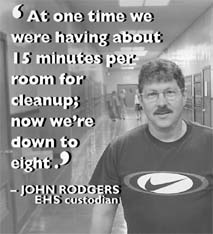 Rodgers said that Eureka High has seven or eight custodians now. "They cut back about five people at the high school in the last 5-6 years," he said. "At one time we were having about 15 minutes per room for cleanup (at day's end); now we're down to eight. You figure there's 900 square feet in a room, and you're supposed to empty the garbage, clean the chalkboards and desk tops, sweep the floors, and clean up anything that's spilled on the floor." Rodgers said that Eureka High has seven or eight custodians now. "They cut back about five people at the high school in the last 5-6 years," he said. "At one time we were having about 15 minutes per room for cleanup (at day's end); now we're down to eight. You figure there's 900 square feet in a room, and you're supposed to empty the garbage, clean the chalkboards and desk tops, sweep the floors, and clean up anything that's spilled on the floor."
Douglas Dean, the high school gym custodian, notes too that there are no substitutes for custodians -- "because there ain't no money for it; so when you're gone, nobody does you job." Bill Schaser told me: "The custodians have always fought against recycling, because it meant more work for them. and I understand that. The custodians are getting squeezed like crazy. They want 'em to do more and more with less and less money. And, again, it shouldn't be the custodian's job to do the recycling; it should be the school's job. Now they don't clean classrooms, I understand. They don't have the time, they're in and out, they're all over the place. For nine bucks an hour? Why should they care? And the ones that do are damned good people. When they worked with me, they were great." English teacher Bob Chapman says: "I know that Bob Embertson (principal of Eureka High) thinks we may have the best recycling program in the county in terms of schools. If that's true, it's a pretty horrible statement about recycling in the schools." When I got hold of Bob Embertson for a brief interview by telephone, he does indeed tell me: "We probably recycle more than any other high school in the county." But he also readily acknowledges: "It's not a perfect system. We also throw away huge amounts. Pound after pound that should be recycled goes into the garbage." Embertson, however, can be credited with ending Eureka High's infamous student tradition of emptying their lockers at year-end and dumping everything in the hallways -- "just a horrible practice," as Bob Chapman recalls. "I mean," he goes on, "the hallways would be this deep (he holds, his hands a foot apart) in papers and binders, everything -- a safety hazard, a disgusting display of waste. And a lot of us new folks were just horrified." Greg V. Asanian, now associate superintendent of the Eureka school district, who preceded Embertson as Eureka High's principal from 1990 to 1995, recalls that he tried but failed to end the tradition. "I just talked to the kids about it," he said. "Could we do something a little less environmentally damaging? We gave it a shot, and it didn't fly." The students, he said, "considered this their own little ticker tape parade." Embertson wrote finis to it by calling in the Eureka Fire Department. Chapman relates: "And the Fire Department said, `This can't go on. That's a total safety hazard.' So the first couple years we had firemen all over the campus, and that display was the difference between a tradition carrying on and a tradition ending. And Bob had a huge part in that." Recently I met with Mary Lou Cook at her home and office in Arcata. Bill Schaser, who knew her from their days working together at Eureka High, fondly describes Cook as "a rabid recyclist." Actually, she carries it beyond recycling. She operates an educational program called Don't Buy Garbage, which she runs through contracts with Humboldt County and the cities of Eureka and Arcata. Her focus is on what she sees as the neglected area of "reducing and reusing," which leaves me momentarily perplexed. Reducing, she explains, means "reducing garbage, reducing the amount that you throw in the can." She adds, "And that means buying things that don't have much packaging or buying things in recyclable containers. It can also mean just buying less stuff." And reusing? "For example," she says, "if we use a cloth dish towel in the kitchen instead of paper towels. Or if we use cloth to wash your windows instead of paper towels. Every time you use a cloth towel, you're saving those paper towels from going into the garbage. "It's less wasteful. Or if you use a mug instead of a styrofoam cup for your coffee... It just means not being as wasteful, thinking about what you buy and how much of it goes into the trash can. That's why this program is called Don't Buy Garbage." She scoffs, for example, at those big plastic garbage bags you buy to hold the stuff you throw into the garbage can. "People use them without even thinking, because they've become so much a part of our culture," she says. Those bags, however, are just so much garbage. "Plastic comes from oil and natural gas," she says. "These are not renewable resources. These are the kinds of things we try to get people to think about." It isn't always easy, Cook admits. Not all teachers, for example, want to participate in recycling. "There might be understandable teacher cynicism," she says, "because recycling programs have been started and stopped, started and stopped, so it's a real frustration for some teachers." In fact, she says, the administration at Arcata's Pacific Union Elementary School, which has won countless awards for its recycling efforts and is often cited as a recycling role model, "wasn't real supportive" when the program was initiated there some years back. So Cook and one of the teachers, plus students and other volunteers started the ball rolling with a "trash-free party," providing reusable plates and spoons to serve the party-goers, cleaning up afterwards with the school's dishwasher. Cook remembers starting her program at Eureka High with students from Schaser's classes. The idea was to use high school students as the messengers to take the program to elementary schools. "Young children," she notes, "really look up to high school students." They started preaching the message to fourth grade elementary school students. "They're old enough to really understand what this means," Cook says, "and they're young enough to be able to form habits that will last for a lifetime. They're really open to ideas." One thing that quickly comes through in listening to Mary Lou Cook is her fervent commitment to recycling, or to her own theme of reducing and reusing. You are not likely to hear any cynicism or pessimism from her. She is totally upbeat. And I came away ready to carry the message myself. As it happened, on my way back to Eureka I stopped of at the Humboldt County Library to drop off some books. Before leaving, I popped into the men's room, and after washing my hands realized I would have to dry them on paper towels -- three or four of them at least. Totally wasteful, I'm thinking, with Mary Lou Cook's message fresh in my mind. You'd think the county library would get it and switch to those cloth towel roller gizmos. You know: Stop Buying Garbage!
School recycling addendum 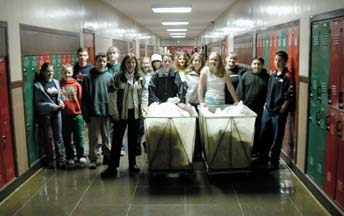
Students fromMr. Miller's EHS English class, last week's designated recyclers. -- reported by Bob Doran There have been a few developments since George Ringwald completed his recycling investigation reported above. According to several Eureka High teachers, the reporter's questions spurred the school administration to action and some progress had been made toward reviving the paper collection system established years ago by Bill Schaser. The recycling issue was also on the agenda at the first faculty meeting of the school year. Stephen Miller, who teaches freshman English, was among those who volunteered his students as paper collectors. When I showed up last Friday morning to take photographs for this report, I was asked to wait while the students were prepped for their first round as recyclers. Apparently, in spite of a memo sent to faculty, many teachers had not put their recycling bins outside the doors. Out in the halls, the students seemed to enjoy their break from routine. Miller sent teams off to different wings and across the street to Marshall. Two carts were hastily filled with plastic bags of mixed white and colored paper, then dumped in a dumpster along with cardboard. According to Shawn Bennett, Eureka City Schools waste recycling specialist, a system is now in place. (He admitted that the old system had broken down following Schaser's departure.) "Every Friday a different group will go around," he said. The ROTC program, Miller's class, the agriculture department and other student groups will take turns. The paper is not separated by color even though Eel River Disposal, which collects the recyclables, would prefer it that way. "It's too big of a project," said Bennett. "You have to separate your white paper, separate your colored, separate your newsprint and your magazines. To get as many employees as we have to remember that is almost impossible. I can't be at every school in every classroom chastising someone because they put a pink piece of paper in with the white." Do the other area high schools find recycling as difficult? Not at all, according to staff at Arcata and McKinleyville high schools. At both schools, faculty and students work with maintenance staff to collect all types of recyclable items. White paper is collected separately from colored; newspaper and cardboard are also recycled. Money from the return of bottles and cans is set aside in scholarship funds at each school. Marty Mathiesen, assistant superintendent for the Fortuna Union School District, was very enthusiastic about the recycling program at Fortuna High. It's run by Pam Halsted, a science teacher also involved in creek restoration. "Recycling is the right thing to do," said Mathiesen, "but there is also a cost involved if you don't do it. I'm looking at how much we pay for [trash] disposal -- but even if it cost more we'd still do it." Mathiesen said that Halsted's students take care of most of the work and any money that comes in goes toward the Fortuna Creeks Project. "Everybody's into it," he added.
IN THE NEWS | HUMBOLDT RESPONDS to Terrorist Attacks | CALENDAR Comments? E-mail the Journal: [email protected] 
© Copyright 2001, North Coast Journal, Inc. |